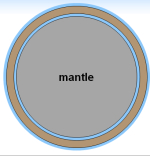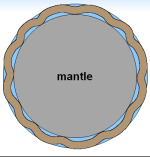Incorrect.
"Firmament" is used exactly nine times in Genesis 1:
The FIRST FIVE are simply "firmament."
- a "firmament" in the midst of the waters
- god made the "firmament"
- waters under the "firmament"
- waters above the "firmament"
- God called the "firmament" Heaven
This is where God first introduces the word "Heaven" (and it is always given in the plural: "Heavens"). Up until this time, the firmament was being formed (more from absence of material), and when He was done, He gave us the name for it. The same for the earth (dry), that was named when it appeared. Both of these were given in Gen 1:1 as goals of the creative process:
[Gen 1:1 NKJV] In the beginning God created the heavens and the earth.
Followed by how He made them, at which point He named them:
[Gen 1:8 NKJV] And God called the firmament Heaven. So the evening and the morning were the second day.
[Gen 1:10 NKJV] And God called the dry [land] Earth, and the gathering together of the waters He called Seas. And God saw that [it was] good.
Between Gen 1:1 and Gen 1:8, God didn't use the word "Heavens", because they (it?) didn't exist. Between Gen 1:1 and Gen 1:10, God didn't use the word "Earth", because it didn't exist, Earth being the dry land, and Heavens being the space above the dry land.
After the term has been defined, God used it in accordance with the definition He had provided, as you show, here:
The LAST FOUR uses are qualified with the phrase "of the heavens":
- lights in the "firmament of the heavens"
- lights in the "firmament of the heavens"
- God set the lights in the "firmament of the heavens"
- birds fly above the earth across the face of the "firmament of the heavens"
Note that there are two things the firmament has: an "in" characteristic and an "on" characteristic (same concept as "across the face". The "in" is used to for things like "stars", "sun", and "moon", and the "on" is used for birds, where they fly. The sky, where birds fly, is the part of the expanse that we can experience, but it isn't the expanse. It is merely the surface of it, from our point of view.
Note verse 9:
Then God said, “Let the waters under the heavens be gathered together into one place, and let the dry land appear”; and it was so.
Then God said, “Let the waters under the heavens be gathered together into one place, and let the dry land appear”; and it was so.

www.biblegateway.com
"Under the heavens" and "dry land" preclude the last few verses from talking about the sky, because dry land is "on top," not "underneath," and it introduces "the heavens" being above the dry land and the waters.
In other words:
The world was covered in water (vs 2)
God made a firmament in the midst of the waters, separating the waters above from "the deep" (vs 6; cf vs 2)
God caused some of the firmament that he created to rise above the waters above to form dry land and introduces the concept of the heavens (vs 9)
No, He introduces the concept when He made it, which all happened before he named it, in vs 8. To say God defines a word, then uses it for a completely different concept is the confusion factor I mentioned.
God then places lights in the heavens (called a firmament)
God then makes birds that fly across the face of the heavens (called a firmament)
I think you just reversed what you said before, that the firmament is called heavens, then the term changes to "firmament of the heavens". But now you are saying the the heavens is called a firmament. I don't see how you can get away from the idea that the heavens HAS a firmament, and it also has a surface. I'll try to remember to come back to this dichotomy.
Again:
The concept of "the heavens" is not introduced until verse 9, AFTER God is almost finished with the firmament CALLED Heaven, and since "earth" (the dry land) is now complete, He moves His attention to the things "above" (positionally) the firmament called heaven, creating plants, and creatures in the waters above the firmament, and that fly across the face of the firmament of the heavens.
Did you catch that?
God created creatures in the waters above the firmament, and other creatures that fly across the face of the firmament of the heavens.
Except the verses NEVER say God made any creatures "above" the firmament. (Prove me wrong on this, if you can!) That word combination doesn't exist in the passage, at all, ever. There is something introduced regarding "in" the firmament of the heavens and "on" (across the face of) the firmament of the heavens, as you rightly pointed out. But if the same firmament of the heavens is in view for both of those, neither can be talking about a firmament that is below where the birds fly (no stars could be there) or above where the stars are (no birds are there, as far as we can tell, and the bird part of the passage also deals with fish, which we can get access to--they aren't in some place above the firmament of the heavens. And they aren't in some firmament of the earth, called "heaven", because it isn't a concept spelled out that way.
Called "Heavens".
Firmament of the heavens.
They are two different things.
Let me offer an explanation that I think fits the scripture better. When God made the space between the waters, He made it firm. How did He do that, make "space" to be "firm"? According to our current theories of the structure of space, He used gravity and motion. Gravity to keep the system from blowing apart, and motion to keep the system from collapsing on itself. There could well be more to it, but that at least provides for a "firmament" of the heavens. And the surface of the firmament, the "face" of it, is the interface between the earth (dry land) and the firmament, called heavens (the space), or the firmament of the space. You can't have the space without a firmament, so the firmament is the space and is of the space.
Exactly, hence, "trunk OF THE CAR" is used to clarify the difference.
Just like "of the heavens" is used to differentiate between the "firmament" and the "firmament of the heavens"
Except God gave no other context. He literally talks about the trunk of the car, defining "trunk" as that space, then, in my scenario, He used the word immediately after for some un-introduced concept. It's possible, but confusing. And God isn't trying to be confusing, since He spends a fair amount of time defining words.
So the lights in the firmament of the heavens are in the dry ground called earth?
I don't understand your question here, except that you are reading my words from your presuppositions. I don't think that works for that part of my post.
Sorry, that doesn't work, for the reasons I showed above in this post.
Agreed. That's why I think you should reject the idea. God defined what "heavens" refers to, and He stuck with that definition. He didn't define a word, then never used the word in that same way again, as your view has Him doing. If you don't believe me, go back to your list of uses of "firmament". He makes a firmament by separating waters; He calls the firmament "heavens"; He then talks about a firmament that He associates with "heavens"; and He never again refers to the ground firmament as "heavens".
You missed the point.
Day 1 - "and God saw the light, that it was good" (vs 4)
Day 2 - none
Day 3 - "and God saw that it was good" (vs 10); "and God saw that it was good" (vs 12)
Day 4 - "and God saw that it was good" (vs 18)
Day 5 - "and God saw that it was good" (vs 21)
Day 6 - "and God saw that it was good" (vs 25); "Then God saw everything that He had made, and indeed it was very good." (vs 31)
The chapter itself shows that there is a "God saw that it was good" after each thing that he makes (with the exception of man, which is the pinnacle of His creation).
No, He absolutely did NOT provide a "God saw that it was good" after each thing he makes. For instance, He did not "see that it was good" after the Sun, or the moon, but only after the stars also, and when they were put in place. It wasn't enough, in the system of lights in the firmament, just to have a Sun. So He waited until He had also made the moon and the stars and set them in their places before He saw that it was good.
What this ALSO shows us is that God started something on day 2,
Agreed!
but did not finish it until partway through day 3.
Disagree. You haven't established that the thing God didn't see as good was the thing He saw as good partway through day 3. It is just as possible that He left off with the firmament until later (as you agree), but the thing that wasn't good about it was that it was still empty. God doesn't like things that are "void"--they aren't "good"
Then God said, “Let there be a firmament in the midst of the waters, and let it divide the waters from the waters.” Thus God made the firmament, and divided the waters which were under the firmament from the waters which were above the firmament; and it was so. And God called the firmament Heaven.
So the evening and the morning were the second day. Then God said, “Let the waters under the heavens be gathered together into one place, and let the dry land appear”; and it was so. And God called the dry land Earth, and the gathering together of the waters He called Seas.
And God saw that it was good.
Then God said, “Let there be a firmament in the midst of the waters, and let it divide the waters from the waters.” Thus God made the firmament, and divided the waters which were under the firmament from the waters which were above the firmament; and it was so. And God called the firmament...

www.biblegateway.com
Note that ALL FIVE of the FIRST FIVE of the uses of "firmament" are in this passage, and like I said above, none of them have the clarifier "of the heavens." Grammatically speaking, there is no good reason to think that these five are all talking about something different than what the passage describes, and there is no good reason, based on the context of the next four usages that these five are talking about the same thing that the next four are talking about.
Yes, there is a good reason--a word definition. When a word is specifically defined for use in a passage, then it would be strange to never use it for that use again, but instead to use it for something else where the usage was NOT defined. This is standard fare for literary structure.
Sure. The God made the firmament called Heaven in the midst of the waters, dividing the waters above from the deep, like so:
View attachment 11209
And caused part of it to become dry land by making the waters above gather in dips in the firmament. Like so:
View attachment 11207
Yes. The dry land that appeared as a result of the waters above gathering together as a result of Heaven settling was called earth.
It's a nice story, but it isn't a story that's in the first chapter of Genesis.
NO.
God made "Heaven" (the firmament in the midst of the waters", then made "Earth" (the dry land that appeared out of the waters which were gathered) and "Seas" (the waters under "the heavens").
Earth was heaven.
Let's go back to the first verse:
[Gen 1:1 NKJV] In the beginning God created the heavens and the earth.
There are two main foci of the chapter: 1. the heavens, and 2. the earth. If the earth is called "the heavens", then vs 1 wasn't written correctly, it would only say "In the beginning God created the heavens." But it would be confusing, because the reader wouldn't be sure whether that verse was talking about the earth that is called "Heavens" or another thing that is called "Heavens."
The place where God lived.
A paradise.
What we today would call "heaven on earth," but instead of it being a figure of speech, it was literally heaven!
The "firmament of the heavens" is itself a figure of speech, referring to the expansiveness of the sky, as though it had been stretched out (like "raqqa" would imply), an expanse.
Only because you're being intentionally obtuse, Derf! STOP IT!
THE FIRMAMENT is what was called Heaven, Derf!
NOT "the firmament of the heavens"!
If you cant distinguish between those two concepts mentally, then there's no possible way for me to help you understand this topic!
Yes, that is what I mean by "the epitome of confusion". You can't help me understand the topic in the way you are explaining it, but not because of my obtuseness. It's because of the inconsistency in your explanation.
I've talked to two scientists that are familiar with and promote Dr. Brown's hydroplate theory, and both of them agree with me that calling the earth heaven is an unnecessary part of the theory. I won't give there names here in the public part of the forum, because I don't want to cause dissension. I can give their names on a private chat with you, if you like. One of them was in a conversation just this week at the homeschool conference in Denver, and I expect you will recognize his name.
Saying it doesn't make it so!
Using that phrase doesn't make it NOT so, either.
One more point. I already stated that God first told us what He was going to explain in Gen 1:1, the creation of the heavens and the earth. He then gave the detailed version of the creation in Gen 1:2-31, wrapping it up in 6 days. Then He did (through Moses, of course) what any skilled presenter of information would do, and gave a recap of what He had just explained...a synopsis to make sure everyone got the point. This is what the military are told to do when giving a briefing: "First, tell them what you're going to tell them. Second, tell them what you want to tell them. Third, tell them what you just told them.
Here it is:
[Gen 1:1 NKJV] In the beginning God created the heavens and the earth.
[Gen 1:2-31 is the full description]
[Gen 2:1 NKJV] Thus the heavens and the earth, and all the host of them, were finished.
There's the clincher in the last verse. "Heavens" is used of what here? Of the solid material between the deep and the surface of the globe? No, it is obviously talking about the "firmament of the the Heavens", because it includes the contents: "and all the host of them." This is repeated in the Sabbath commandment as "and all that is in them."
[Exo 20:11 NKJV] For [in] six days the LORD made the heavens and the earth, the sea, and all that [is] in them, and rested the seventh day. Therefore the LORD blessed the Sabbath day and hallowed it.
We can tell, therefore, that the intention of the use of the word "Heavens", used these two places without "firmament of the" added to it, is on the place where God set the sun, moon, and stars, and not in the ground.




